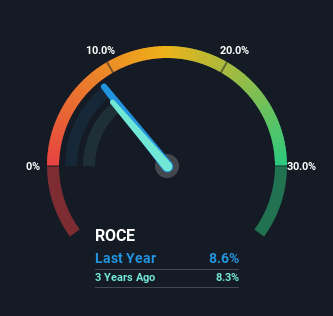- Saudi Arabia
- /
- Basic Materials
- /
- SASE:3092
Here's What's Concerning About Riyadh Cement's (TADAWUL:9512) Returns On Capital
When we're researching a company, it's sometimes hard to find the warning signs, but there are some financial metrics that can help spot trouble early. Businesses in decline often have two underlying trends, firstly, a declining return on capital employed (ROCE) and a declining base of capital employed. This indicates to us that the business is not only shrinking the size of its net assets, but its returns are falling as well. So after glancing at the trends within Riyadh Cement (TADAWUL:9512), we weren't too hopeful.
What Is Return On Capital Employed (ROCE)?
For those that aren't sure what ROCE is, it measures the amount of pre-tax profits a company can generate from the capital employed in its business. To calculate this metric for Riyadh Cement, this is the formula:
Return on Capital Employed = Earnings Before Interest and Tax (EBIT) ÷ (Total Assets - Current Liabilities)
0.086 = ر.س147m ÷ (ر.س1.9b - ر.س189m) (Based on the trailing twelve months to June 2022).
So, Riyadh Cement has an ROCE of 8.6%. On its own that's a low return, but compared to the average of 6.0% generated by the Basic Materials industry, it's much better.
See our latest analysis for Riyadh Cement

In the above chart we have measured Riyadh Cement's prior ROCE against its prior performance, but the future is arguably more important. If you're interested, you can view the analysts predictions in our free report on analyst forecasts for the company.
What The Trend Of ROCE Can Tell Us
There is reason to be cautious about Riyadh Cement, given the returns are trending downwards. Unfortunately the returns on capital have diminished from the 15% that they were earning five years ago. On top of that, it's worth noting that the amount of capital employed within the business has remained relatively steady. Since returns are falling and the business has the same amount of assets employed, this can suggest it's a mature business that hasn't had much growth in the last five years. If these trends continue, we wouldn't expect Riyadh Cement to turn into a multi-bagger.
On a side note, Riyadh Cement has done well to pay down its current liabilities to 10.0% of total assets. That could partly explain why the ROCE has dropped. Effectively this means their suppliers or short-term creditors are funding less of the business, which reduces some elements of risk. Since the business is basically funding more of its operations with it's own money, you could argue this has made the business less efficient at generating ROCE.
What We Can Learn From Riyadh Cement's ROCE
In summary, it's unfortunate that Riyadh Cement is generating lower returns from the same amount of capital. Investors must expect better things on the horizon though because the stock has risen 3.4% in the last year. Either way, we aren't huge fans of the current trends and so with that we think you might find better investments elsewhere.
On a final note, we found 2 warning signs for Riyadh Cement (1 doesn't sit too well with us) you should be aware of.
For those who like to invest in solid companies, check out this free list of companies with solid balance sheets and high returns on equity.
New: AI Stock Screener & Alerts
Our new AI Stock Screener scans the market every day to uncover opportunities.
• Dividend Powerhouses (3%+ Yield)
• Undervalued Small Caps with Insider Buying
• High growth Tech and AI Companies
Or build your own from over 50 metrics.
Have feedback on this article? Concerned about the content? Get in touch with us directly. Alternatively, email editorial-team (at) simplywallst.com.
This article by Simply Wall St is general in nature. We provide commentary based on historical data and analyst forecasts only using an unbiased methodology and our articles are not intended to be financial advice. It does not constitute a recommendation to buy or sell any stock, and does not take account of your objectives, or your financial situation. We aim to bring you long-term focused analysis driven by fundamental data. Note that our analysis may not factor in the latest price-sensitive company announcements or qualitative material. Simply Wall St has no position in any stocks mentioned.
About SASE:3092
Riyadh Cement
Produces and sells cement in the Kingdom of Saudi Arabia, the Kingdom of Bahrain, the Hashemite Kingdom of Jordan, the State of Kuwait, the State of Qatar, and the Sultanate of Oman.
Flawless balance sheet with solid track record.
Market Insights
Community Narratives



